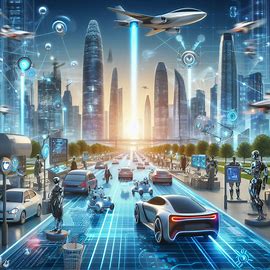Artificial intelligence (AI) is a rapidly evolving technology that has the potential to transform the world of work by 2030. AI refers to the ability of machines or systems to perform tasks that normally require human intelligence, such as reasoning, learning, decision making, or natural language processing. AI can augment or automate various aspects of work, such as data analysis, customer service, product design, or manufacturing.
According to a report by McKinsey Global Institute, AI could create up to $13 trillion of additional economic activity by 2030, and boost global GDP by 1.2% per year. The report also estimates that AI could affect up to 375 million workers, or 14% of the global workforce, by requiring them to change their occupations or skills.
AI could create new jobs and roles AI could generate demand for new skills and occupations, such as AI engineers, data scientists, or AI ethicists, who can develop, manage, or oversee AI applications. AI could also create new opportunities for entrepreneurship, innovation, or social impact, by enabling new products, services, or solutions.
The AI could augment existing jobs and roles: AI could enhance the productivity, quality, or creativity of existing workers, by providing them with tools, insights, or assistance. AI could also enable workers to focus on higher-value or more satisfying tasks, such as problem solving, decision making, or customer interaction, by taking over routine or repetitive tasks.
It could replace existing jobs and roles AI could automate some or all of the tasks performed by existing workers, by performing them faster, cheaper, or better. AI could also eliminate the need for some jobs or roles, by reducing the demand for certain products, services, or functions.
Skill development and education Workers will need to acquire new skills or upgrade their existing skills, to adapt to the changing demands of work. Employers will need to invest in training and reskilling their workforce, to leverage the benefits of AI. Policymakers will need to reform the education system, to provide lifelong learning and career guidance for workers.
Employment and income Workers will need to find new jobs or roles, or transition to different sectors or occupations, to cope with the displacement or disruption of work. Employers will need to create new jobs or roles, or redesign existing ones, to optimize the use of AI. Policymakers will need to provide social protection and income support for workers, to mitigate the risks of unemployment or inequality.
Ethics and governance workers will need to adhere to ethical standards and principles, to ensure the responsible and fair use of AI. Employers will need to establish policies and practices, to ensure the accountability and transparency of AI. Policymakers will need to regulate and monitor AI, to ensure the safety and security of AI.
The report concludes that AI is a powerful and transformative technology that can have a positive or negative impact on work, depending on how it is used and managed. The report also recommends that workers, employers, and policymakers should collaborate and coordinate, to shape the future of work by 2030.The report by McKinsey Global Institute analyzes how AI could transform the world of work by 2030, by creating, augmenting, or replacing various jobs and roles.
It states that AI could create up to $13 trillion of additional economic activity by 2030, and affect up to 375 million workers, or 14% of the global workforce, by requiring them to change their occupations or skills.The report also highlights some of the key challenges and opportunities of AI for work, such as skill development and education, employment and income, and ethics and governance.It suggests that workers, employers, and policymakers should collaborate and coordinate, to shape the future of work by 2030.
Developing new skills or upgrading existing skills workers will need to acquire new skills or upgrade their existing skills, to adapt to the changing demands of work. This may include technical skills, such as programming, data analysis, or machine learning, as well as soft skills, such as communication, collaboration, or creativity. Workers can acquire these skills by taking online courses, attending workshops or seminars, reading books or articles, or joining communities of practice.
Embracing a growth mindset Workers will need to adopt a growth mindset, which means being open to learning new things and overcoming challenges. This will help them to welcome change and innovation, and to see AI as an opportunity rather than a threat. Workers can cultivate a growth mindset by setting goals, seeking feedback, celebrating progress, and embracing failure.


Thank you for the good writeup. It in fact used to be a leisure account it. Look advanced to more introduced agreeable from you! By the way, how can we keep up a correspondence?